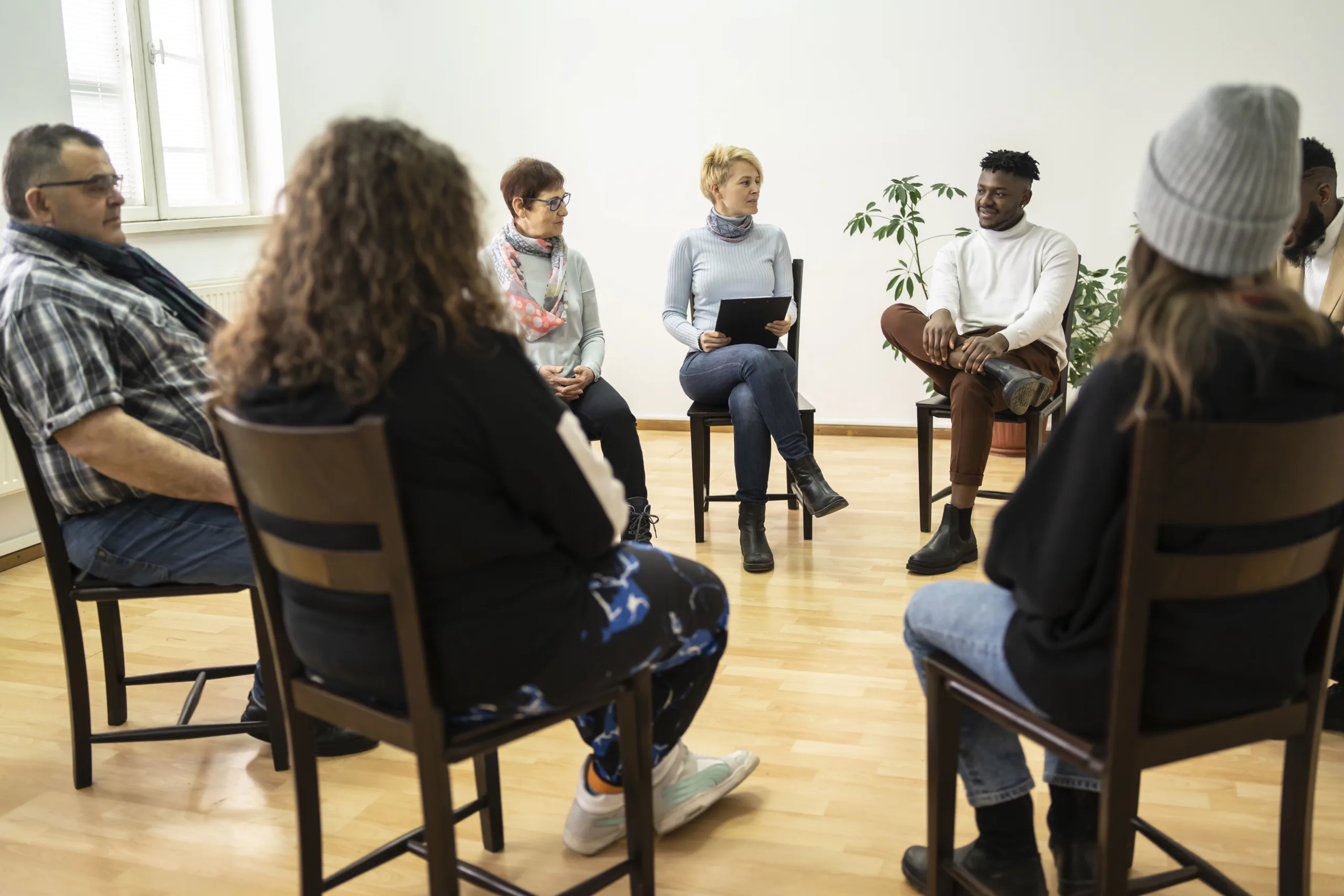24/7 Helpline:
(866) 899-221924/7 Helpline:
(866) 899-2219
Learn more about Klonopin Rehab centers in Neola
Klonopin Rehab in Other Cities

Other Insurance Options

MVP Healthcare

Anthem

Oxford

Choice Care Network

Highmark

State Farm

Horizon Healthcare Service

Private insurance

Excellus

Humana

CareFirst

Self-pay options

AllWell

ComPsych

BHS | Behavioral Health Systems

American Behavioral

Magellan

WellCare Health Plans

Holman Group

Lucent










Youth Academy
Located in Fairmont, West Virginia, Youth Academy is a drug and alcohol treatment center that suppor...

Recovery Point
Recovery Point Charleston is a drug and alcohol addiction recovery center in Charleston, West Virgin...

United Hospital Center – Behavioral Health
United Hospital Center–Behavioral Health is an inpatient mental health and dual diagnosis care cente...

St. Joseph Recovery Center
St. Joseph Recovery Center is a private rehab located in Parkersburg, West Virginia. St. Joseph Reco...

Ascension Recovery Services
Ascension Recovery Services provides full addiction recovery services and interventions. Ascension R...

Recovery U
Recovery U is a private rehab located in Cabin Creek, West Virginia. Recovery U specializes in the t...

Shenandoah Community Health Center
Shenandoah Community Health (SCH) is a comprehensive substance abuse rehab center in Martinsburg, WV...

Mountain State Recovery Center
Mountain State Recovery Center is a private rehab located in Charleston, West Virginia. Mountain Sta...

Family Connections
Family Connections is a private rehab located in Weirton, West Virginia. Family Connections speciali...

Brian’s Safehouse
Brian's Safehouse is a place were men battling addiction can encounter the life-restoring powers of ...

Charleston Comprehensive Treatment Center
Charleston Comprehensive Treatment Center offers medication assisted treatment with methadone for me...

Eastridge Health Systems
Eastridge Health Systems is a private rehab located in Martinsburg, West Virginia. Eastridge Health ...

Westbrook Health Services – Amity Treatment Center
Westbrook Health Services–Amity Treatment Center, in Parkersburg, West Virginia, is a 12 step-focuse...

Huntington Comprehensive Treatment Center
Huntington Comprehensive Treatment Center provides medication assisted treatment for men and women, ...

MedMark Treatment Centers
MedMark Treatment Centers offers outpatient medication assisted treatment for opiate addiction by th...

Valley HealthCare System
Valley HealthCare System - Scott Avenue offers outpatient treatment for individuals with Mental Heal...

Southern Highlands Community Mental Health Center
Southern Highlands Community Mental Health Center offers regular physician's services, OBMAT, DUI cl...

Oasis Behavioral Health
Oasis Behavioral Health offers mental health and substance abuse services. Their approach is gentle,...

Starlight Behavioral Health Services
Starlight Behavioral Health Services is a private rehab located in Huntington, West Virginia. Starli...

Southern Highlands Community Mental Health Center – LEGENDS
Southern Highlands Community Mental Health Center (SHCMHC) is a comprehensive dual diagnosis mental ...

Seneca Health Services
Seneca Health Services offers a variety of services in order to provide for your behavioral health n...

Westbrook Health Services
Westbrook Health Services is a private rehab located in Parkersburg, West Virginia. Westbrook Health...

Potomac Highlands Guild
Potomac Highlands Guild - Charlevoix Place offers outpatient treatment for individuals with substanc...

Clarksburg Comprehensive Treatment Center
For those who are struggling with an opioid addiction. As a leading provider of care, Clarksburg Com...

Valley Healthcare System – ACT Unit
Valley Healthcare System–ACT Unit, in Fairmont, West Virginia, is a comprehensive drug and alcohol r...

Prestera Center – Mountain House Day Treatment
Prestera Center - Mountain House Day Treatment is a non-profit rehab located in Charleston, WV. Pres...

Appalachian Community Health Center
Appalachian Community Health Center is a private rehab located in Elkins, West Virginia. Appalachian...

Family Services – Alcohol and Drug Counseling
Family Services – Alcohol and Drug Counseling is a private rehab located in Fairmont, West Virginia....

Prestera Center
Prestera Center is a private rehab located in Point Pleasant, West Virginia. Prestera Center special...

Princeton Community Hospital – Behavioral Health
Princeton Community Hospital – Behavioral Health is a private rehab located in Bluefield, West Virgi...

Appalachian Community Health Center
Appalachian Community Health Center is a private rehab located in Buckhannon, West Virginia. Appalac...

Charleston Area Medical Center – Behavioral Health
Charleston Area Medical Center - Behavioral Health is a private rehab located in Charleston, WV. Cha...

Potomac Highlands Guild
Potomac Highlands Guild - Maple Avenue offers outpatient treatment for individuals with substance ad...

KVC West Virginia – West Hamlin
KVC West Virginia – West Hamlin is a private rehab located in Branchland, West Virginia. KVC West Vi...

Valley Healthcare System
Valley Healthcare System offers outpatient treatment for individuals with Mental Health Diagnosis an...

FMRS Health Systems
FMRS Health Systems is a private rehab located in Beckley, West Virginia. FMRS Health Systems specia...

Northwood Health Systems
Northwood Health Systems is a private rehab located in Wheeling, West Virginia. Northwood Health Sys...

Eastridge Health Systems
Eastridge Health Systems is a private rehab located in Berkeley Springs, West Virginia. Eastridge He...

Prestera Center – Lincoln Plaza
Prestera Center – Lincoln Plaza is a non-profit rehab located in Branchland, West Virginia. Prestera...

Southern Highlands Community Mental Health Center
Southern Highlands Community Mental Health Center offers outpatient services, OBMAT, DUI classes, AC...

Prestera Center
Prestera Center - Charleston is a dual diagnosis mental health and substance use disorder treatment ...

Youth Services System
Youth Services System is a private rehab located in Wheeling, West Virginia. Youth Services System s...

University Healthcare Berkeley Medical – Behavioral Health
University Healthcare Berkeley Medical – Behavioral Health is a private rehab located in Martinsburg...

Harmony Ridge Recovery Center
Situated in the scenic southern Appalachian Mountains, Harmony Ridge Recovery Center offers comprehe...

Parkersburg Comprehensive Treatment Center
Parkersburg Comprehensive Treatment Center is a private rehab located in Parkersburg, WV. Parkersbur...

Word House
Word House is a private rehab located in Huntington, West Virginia. Word House specializes in the tr...

Youth Health Service
Youth Health Service is a private rehab located in Elkins, West Virginia. Youth Health Service speci...

Kanawha Valley Fellowship Home
The Kanawha Valley Fellowship Home is a West Virginia non-profit organization, supporting men who ar...

Appalachian Community Health Center
Appalachian Community Health Center is a private rehab located in Belington, West Virginia. Appalach...

Seneca Health Services – 804 Industrial Park
Seneca Health Services – 804 Industrial Park is a private rehab located in Maxwelton, West Virginia....

Southern West Virginia Fellowship Home
Southern West Virginia Fellowship Home provides a transitional living house for those adult males wh...

Prestera Center – Viand Street
Prestera Center - Viand Street offers inpatient treatment for individuals with alcohol and/or substa...

West Virginia Sober Living
West Virginia Sober Living operates a series of homes that offer structure and support for those rec...

Mercer County Fellowship Home
Mercer County Fellowship Home offers a transitional living for adult men who are in recovery from al...

Prestera Center
Prestera Center is a private rehab located in Logan, West Virginia. Prestera Center specializes in t...

Sparrow’s Nest
Sparrow’s Nest is a drug and alcohol rehab in Beckley, WV. They provide residential addiction treatm...

Thomas Memorial Hospital – Behavioral Health
Thomas Memorial Hospital – Behavioral Health is a private rehab located in Charleston, West Virginia...

Prestera Center
Prestera Center offers high quality mental health and addiction services. The help people face probl...

United Summit Center
United Summit Center is a non-profit rehab located in Sutton, West Virginia. United Summit Center sp...

Clarksburg Treatment Center
Clarksburg Treatment Center is a private rehab located in Clarksburg, West Virginia. Clarksburg Trea...




























































































































































































































































































































































Adult & Teen Challenge Appalachian Region
Adult & Teen Challenge Appalachian Region provides Christian discipleship training programs for teen...

Williamson Comprehensive Treatment Center
Williamson Comprehensive Treatment Center offers medication assisted treatment with methadone for me...

Clean and Clear Advantage Recovery
Clean and Clear Advantage Recovery is a private rehab located in Parkersburg, West Virginia. Clean a...

Prestera Center – Clay County
Prestera Center – Clay County is a non-profit rehab located in Clay, West Virginia. Prestera Center ...

Hope Drug Rehabilitation
Hope Drug Rehabilitation is a private rehab located in Charleston, West Virginia. Hope Drug Rehabili...

Newness of Life Huntington WV
Newness of Life Huntington WV is a private rehab located in Huntington, West Virginia. Newness of Li...

Recovery Point
Recovery Point provides substance use disorder treatment at no cost in Huntington, West Virginia. Th...

Spero Health – Clarksburg
Spero Health – Clarksburg is a private rehab located in Clarksburg, West Virginia. Spero Health – Cl...

Crittenton Services – Outpatient
Crittenton Services – Outpatient is a private rehab located in Parkersburg, West Virginia. Crittento...

Storm Haven Transitional Home
Storm Haven Transitional Home is a private rehab located in Raleigh, West Virginia. Storm Haven Tran...

Prestera Center
Prestera Center is a non-profit rehab located in Wayne, West Virginia. Prestera Center specializes i...

Crittenton Services – Outpatient
Crittenton Services – Outpatient is a private rehab located in Weirton, West Virginia. Crittenton Se...

Westbrook Health Services – Roane County Office
Westbrook Health Services is a CARF-accredited behavioral health treatment center in Spencer, WV. It...

Appalachian Community Health Center
Appalachian Community Health Center is a private rehab located in Parsons, West Virginia. Appalachia...

Westbrook Health Services – Pleasants County Office
Westbrook Health Services – Pleasants County Office is a private rehab located in Saint Marys, West ...

HealthWays – Miracles Happen
HealthWays – Miracles Happen is a private rehab located in Wheeling, West Virginia. HealthWays – Mir...

Renaissance Place
Renaissance Place is a private rehab located in Huntington, West Virginia. Renaissance Place special...

FMRS Health Systems
FMRS Health Systems is a private rehab located in Fayetteville, West Virginia. FMRS Health Systems s...

United Summit Center
United Summit Center is a non-profit rehab located in Grafton, West Virginia. United Summit Center s...

Seneca Health Services – Industrial Park Road
Seneca Health Services – Industrial Park Road is a private rehab located in Maxwelton, West Virginia...

General Rehabilitation Services
General Rehabilitation Services is a private rehab located in Charleston, West Virginia. General Reh...

KVC West Virginia – Wayne
KVC West Virginia – Wayne is a private rehab located in Wayne, West Virginia. KVC West Virginia – Wa...

Olympia Center – Adolescent Treatment
Olympia Center – Adolescent Treatment is a private rehab located in Kingwood, West Virginia. Olympia...

Implement Neuro Rehab
Implement Neuro Rehab is a private rehab located in Huntington, West Virginia. Implement Neuro Rehab...

United Summit Center
United Summit Center is a non-profit rehab located in Terra Alta, West Virginia. United Summit Cente...

KVC Behavioral Health
KVC Behavioral Health is a private rehab located in Charleston, West Virginia. KVC Behavioral Health...

Prestera Center
Prestera Center is a non-profit rehab located in Huntington, West Virginia. Prestera Center speciali...

Potomac Highlands Mental Health
Potomac Highlands Mental Health is a private rehab located in Franklin, West Virginia. Potomac Highl...

Crittenton Services
Crittenton Services is a private rehab located in Wheeling, West Virginia. Crittenton Services speci...

Westbrook Health Services – Ritchie County
Westbrook Health Services – Ritchie County is a private rehab located in Harrisville, West Virginia....

REA of Hope
REA of Hope offers a safe, supportive and substance-free environment where women can continue their ...

Wheeling Comprehensive Treatment
Wheeling Comprehensive Treatment provides medication assisted treatment for those who are addicted t...

Al – Anon
Al – Anon is a non-profit rehab located in Wheeling, West Virginia. Al – Anon specializes in the tre...

Westbrook Health Services – Jackson County Office
Westbrook Health Services–Jackson County Office, in Ripley, West Virginia, provides mental health ca...

Potomac Highlands Guild
Potomac Highlands Guild - New Creek Highway offers outpatient treatment for individuals with substan...

Appalachian Regional Healthcare – Behavioral Health
Appalachian Regional Healthcare – Behavioral Health is a drug and alcohol rehab located in Beckley, ...

Beckley Comprehensive Treatment
Beckley Comprehensive Treatment offers medication assisted treatment with methadone for men and wome...

Steps – Up
Steps – Up is a private rehab located in Charleston, West Virginia. Steps – Up specializes in the tr...

Starlight Behavioral Health Services
Starlight Behavioral Health Services is a private rehab located in Hurricane, West Virginia. Starlig...

FMRS Health Systems
FMRS Health Systems is a private rehab located in Hinton, West Virginia. FMRS Health Systems special...

United Summit Center – Recovery Center
United Summit Center – Recovery Center is a non-profit rehab located in Terra Alta, West Virginia. U...

Prestera Center for Mental Health
Prestera Center for Mental Health is a private rehab located in Dunbar, West Virginia. Prestera Cent...

Crittenton Services – Outpatient
Crittenton Services – Outpatient is a private rehab located in New Martinsville, West Virginia. Crit...

Alcohol and Substance Abuse Treatment
Alcohol and Substance Abuse Treatment is a private rehab located in Martinsburg, West Virginia. Alco...

Hillcrest Outpatient – Touchstones Treatment Center
Hillcrest Outpatient – Touchstones Treatment Center is a private rehab located in Wheeling, West Vir...

Southern Highlands CMHC
Southern Highlands CMHC is a private rehab located in Welch, West Virginia. Southern Highlands CMHC ...

Logan Mingo Area Mental Health
Logan Mingo Area Mental Health is a private rehab located in Chattaroy, West Virginia. Logan Mingo A...

Vocational Rehabilitation Service
Vocational Rehabilitation Service is a private rehab located in Charleston, West Virginia. Vocationa...

AA – Alcoholics Anonymous
Alcoholics Anonymous (AA) is a non profit rehab located in Morgantown, WV. Alcoholics Anonymous (AA)...

Jacob’s Ladder
Jacob’s Ladder is a long term residential recovery center for young men located in Aurora, West Virg...

AA – Alcoholics Anonymous
AA – Alcoholics Anonymous is a non-profit rehab located in Wheeling, West Virginia. AA – Alcoholics ...

United Summit Center – West Main Street
United Summit Center – West Main Street is a non-profit rehab located in Sutton, West Virginia. Unit...

United Summit Center
United Summit Center is a non-profit rehab located in Weston, West Virginia. United Summit Center sp...

Development Therapy Center
Development Therapy Center is a private rehab located in Huntington, West Virginia. Development Ther...

Northwood Health Systems
Northwood Health Systems is a private rehab located in New Martinsville, West Virginia. Northwood He...

Anchor Point Residential Treatment Center
Anchor Point Residential Treatment Center is a private rehab located in Delbarton, West Virginia. An...

United Summit Center – Monongalia County
United Summit Center – Monongalia County is a non-profit rehab located in Morgantown, West Virginia....

Family Preservation Services – Romney
Family Preservation Services – Romney is a private rehab located in Romney, West Virginia. Family Pr...

New Beginnings Program
New Beginnings Program offers inpatient treatment for women with alcohol and/or substance addiction....

United Summit Center
United Summit Center is a non-profit rehab located in Fairmont, West Virginia. United Summit Center ...

Northwood Health Systems – Outpatient
Northwood Health Systems – Outpatient is a private rehab located in Wheeling, West Virginia. Northwo...

Southern Highlands Community Mental Health Center – CRU
Southern Highlands Community Mental Health Center - CRU is a six bed Crisis Respite Unit for individ...

Prestera Center
Prestera Center - Kenmore Drive offers outpatient treatment for individuals with alcohol and/or subs...

Prestera Community Supportive Services
Prestera Community Supportive Services is a private rehab located in Huntington, West Virginia. Pres...

Prestera Center – Prestera Way
Prestera Center – Prestera Way is a non-profit rehab located in Huntington, West Virginia. Prestera ...

Southern Highlands Community Mental Health Center
Southern Highlands Community Mental Health Center offers regular physician's services, OBMAT, DUI cl...

Southern Highlands Community Mental Health Center – Springhaven
Southern Highlands Community Mental Health Center - Springhaven provides children's services to neig...

KVC Behavioral Healthcare
KVC Behavioral Healthcare is a private rehab located in Verdunville, West Virginia. KVC Behavioral H...

Mingo Area Mental Health
Mingo Area Mental Health is a private rehab located in Stollings, West Virginia. Mingo Area Mental H...

Life Changers Outreach – West Virginia Men’s Center
Life Changers Outreach is a 12-month discipleship program for men struggling with various types of b...

United Summit Center
United Summit Center is a non-profit rehab located in Morgantown, West Virginia. United Summit Cente...

Pyramid Counseling
Pyramid Counseling is a private rehab located in Charleston, West Virginia. Pyramid Counseling speci...

Clifford and McNeely Counseling
Clifford and McNeely Counseling is a private rehab located in Charleston, West Virginia. Clifford an...

Prestera Center – Prestera Addictions Recovery Center
Prestera Center – Prestera Addictions Recovery Center is a non-profit rehab located in Charleston, W...

Healthways – Adolescent Outpatient
Healthways – Adolescent Outpatient is a private rehab located in Weirton, West Virginia. Healthways ...

United Summit Center
United Summit Center is a non-profit rehab located in Buckhannon, West Virginia. United Summit Cente...

Wellspring Family Services
Wellspring Family Services is a private rehab located in Morgantown, West Virginia. Wellspring Famil...

Prestera Center – Laurelwood East
Prestera Center - Laurelwood East offers inpatient treatment for individuals with alcohol and/or sub...

Potomac Highlands Guild
Potomac Highlands Guild - Mountain View Street offers outpatient treatment for individuals with subs...

Prestera Center – Laurelwood West
Located in Huntington, West Virginia, Prestera Center – Laurelwood West is a drug and alcohol rehab ...

Counseling Connection
Counseling Connection is a private rehab located in Charleston, West Virginia. Counseling Connection...

The LifeHouse
The Lifehouse is a nonprofit organization created to help men and women recover from alcoholism and ...

Appalachian Health Services
Counseling Services provided at this location by Appalachian Health Services, a Division of Ohio Val...

KISRA – Kanawha Institute for Social Research & Action
KISRA - Kanawha Institute for Social Research & Action through KISRA Cares supports individuals in t...


































































































































































































































































